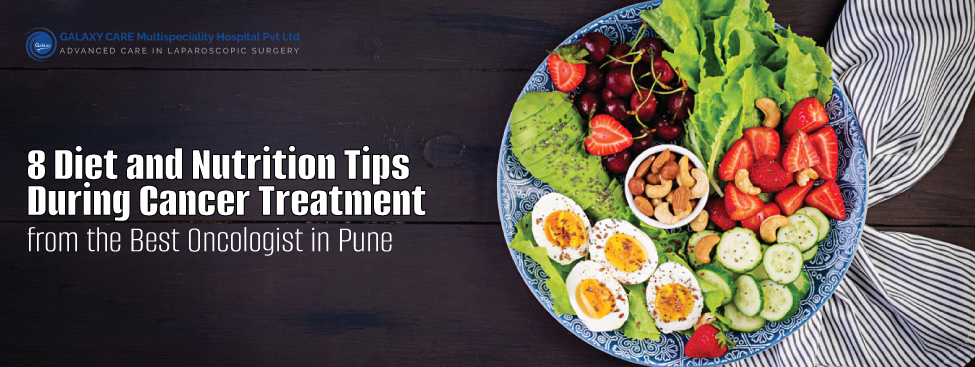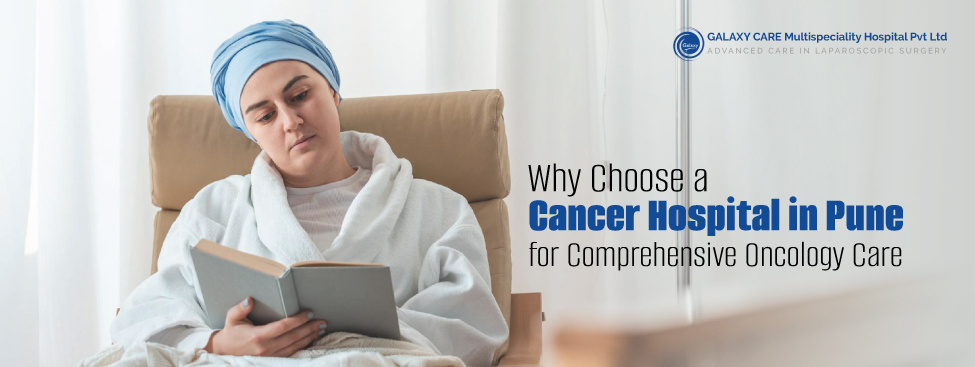
8 Diet and Nutrition Tips During Cancer Treatment from the Best Oncologist in Pune
Navigating cancer is a life-changing journey, not only for patients but also for their families and caregivers. During this challenging time, taking care of your body with the right nutrition becomes more important than ever. Food is not just a source of energy—it is essential for building strength, boosting immunity, managing side effects, and speeding up recovery while undergoing treatment.
Malnutrition affects 20-70% of cancer patients globally. Good nutrition isn’t just a theory—it’s proven. Following a balanced, healthy diet can help those undergoing cancer treatment tolerate therapies better and improve their overall quality of life. Let’s explore top 8 diet and nutrition tips during cancer treatment from the best oncologist in Pune, designed to guide and support patients at every step of their journey.
Why Nutrition Matters in Cancer Care
Did you know that what you eat directly affects how your body handles cancer treatment? Nutrition fuels your immune system, helps your tissue repair, and gives you the energy you need to fight back against cancer and regain your health. Leading doctors stress the importance of nutrition during treatment. Good nutrition can help you maintain your strength, prevent infections, and recover faster—key factors for anyone undergoing chemotherapy, radiation, or surgery. Treatments can be tough on the body, often causing side effects like nausea, fatigue, taste changes, or loss of appetite. The right foods can help you manage these challenges, making the journey smoother. With this foundation, let’s explore eight easy-to-follow diet and nutrition tips.
8 Diet and Nutrition Tips For Cancer Patients
1. Prioritize Protein-Rich Foods
Proteins are the building blocks your body needs for tissue repair, immune function, and to fight infections. Chemotherapy and radiation can break down your muscles and tissues, but eating enough protein supports healing and muscle maintenance.
What to eat: Eggs, fish, lean chicken, turkey, dals, beans, lentils, and tofu. Even milk, paneer, and yogurt are excellent protein sources. Including protein in every meal helps you keep your strength up—especially important if you’re losing weight.
If there are days your appetite is low, try adding a scoop of protein powder to your soups or smoothies for an extra boost. Mixing dals and grains also increases the protein quality of the meal. If you face difficulty chewing, try soft foods like well-cooked dals, scrambled eggs, or curd. Always consult your nutritionist or doctor before introducing supplements.
2. Stay Hydrated
Water is your best friend. Treatments may cause dehydration or leave you feeling tired. Drinking enough fluids can prevent headaches, constipation, and fatigue. Try water, clear soups, herbal teas, coconut water, or homemade fruit juices (without too much sugar). Broths are gentle on upset stomachs and help keep you hydrated. Carry a water bottle so you remember to sip throughout the day.
Sometimes you may not feel thirsty, but your body still needs fluids—set reminders or keep a colorful bottle nearby as a visual cue. If plain water tastes bland, infuse it with fresh fruit slices or herbs like mint for a gentle flavor. Dehydration can also make side effects worse, so make hydration part of your routine, even taking small sips often throughout the day. If you have vomiting or diarrhoea, increase your fluid intake as advised by your doctor.
3. Eat Small, Frequent Meals
Loss of appetite or nausea is common during treatment. Instead of forcing yourself to eat three big meals, try having smaller, more frequent meals. This approach is less overwhelming and can help maintain energy levels. Good snacks include: Fresh fruit, nuts, cheese, yogurt, whole-grain crackers, or energy balls made from dried fruit and seeds. Listen to your body—eat what feels right at that time.
You might find food more appealing when it’s nicely plated or served at room temperature, which can reduce smells that might trigger nausea. If mornings are harder, eat your biggest meal when you feel best during the day. Don’t hesitate to ask family or caregivers for help preparing easy-to-grab nutrient-rich snacks. Keep a snack box handy for between-meal hunger pangs—even a few bites at a time are helpful.
4. Include a Variety of Fruits and Vegetables
Fruits and vegetables provide antioxidants, important vitamins, and fiber. They help the body fight infections, repair cells, and regulate digestion. Oncologists often recommend a “rainbow diet”—filling your plate with colorful fruits and veggies to get a range of nutrients.
Tip: Choose seasonal, locally available fruits and vegetables. Wash them thoroughly to remove pesticides and reduce infection risks, especially important when immunity is low.
Blend fruits into smoothies or add finely chopped veggies to dals and parathas if you have trouble chewing. Cooking vegetables slightly can make them easier to digest without losing too many nutrients. If raw salads are discouraged due to low immunity, opt for steamed or cooked alternatives. The goal is to enjoy different colors—each color offers unique benefits your body needs while healing.
5. Limit Processed and Sugary Foods
Processed snacks, sugary drinks, and ready-made foods can weaken your immune system and fuel inflammation, making it harder for your body to heal. Reading food labels can help you spot hidden sugars and unhealthy fats. Home-cooked meals allow you to control ingredients and avoid preservatives. Craving sweets? Try dates, figs, or a homemade fruit salad for a healthier treat. Gradually reducing processed foods will not only support your immune system but can also help manage treatment side effects better.
Choose instead: Whole grains (like brown rice, oats, whole wheat bread), fresh fruits, and wholesome homemade meals. Limit biscuits, chips, colas, packaged juices, and sweets.
6. Manage Side Effects with Tailored Foods
Side effects differ from person to person. Adjusting your diet can help you feel better:
- For nausea: Sip ginger tea or eat plain dry crackers.
- For mouth sores: Opt for soft foods like pureed soups, smoothies, curd, soft rotis, or rice.
- For constipation: Go for fiber-rich options—whole grains, fresh fruits like papaya, prunes, figs, and drink more water.
If you experience diarrhea, avoid high-fiber or spicy foods and consult your doctor for suitable options. Keeping a food diary may help you identify triggers for discomfort so you can adjust your meals. Always inform your nutritionist or doctor about persistent symptoms—they can personalize your eating plan for better comfort and relief. Remember: gentle, soothing foods can make mealtimes more pleasant during tough days.
7. Focus on Immune-Boosting Foods
Certain foods naturally help support your immune system, critical during treatment.
Include: Oranges, lemons, and guavas (rich in vitamin C); mushrooms, fatty fish, and egg yolks (vitamin D); leafy greens and nuts (zinc); and probiotic foods like curd or buttermilk. These foods can help reduce your risk of infections and promote faster recovery.
Try adding lemon juice to salads or sipping on a glass of chaas (buttermilk) between meals. For vitamin D, sunlight is also beneficial; consider short, safe exposure as recommended by your doctor. If you’re not able to eat certain foods, discuss safe alternatives or supplements with your healthcare team. A well-nourished body is better able to handle the demands of treatment and healing.
8. Consult a Nutritionist Along with Your Oncologist
Each cancer journey is unique. That’s why personalized nutrition advice is so important. The best oncologist in Pune works closely with trained dieticians to create diet plans that match your specific medical and personal needs. Getting expert guidance helps you make informed choices and adapt plans as your treatment changes.
Never hesitate to speak up about symptoms or difficulties you face with eating—experts are trained to modify your plan to ease your journey. A nutritionist can also help introduce new taste experiences if you’re sensitive to certain flavors or textures. At Galaxy Care Hospital, our nutrition experts and the best oncologist in Pune support you at every step, so you never have to walk this path alone. Your needs, preferences, and comfort always come first.
Follow a Good Diet to Aid Cancer Recovery
It may be appealing to follow random diet plans found online, but every cancer treatment—whether chemotherapy, radiation, or surgery—impacts each patient differently. Generic advice from the internet can sometimes do more harm than good, especially if you are coping with side effects or a weakened immune system.
At Galaxy Care Hospital, the best oncologists in Pune work closely with nutrition experts to ensure that your diet plan is personalized to your treatment, health condition, and preferences. This holistic approach focuses not only on treating the disease but also on supporting your overall well-being throughout recovery. Always remember: before making any dietary changes, consult your doctor or a qualified nutritionist to manage side effects safely, address allergies, and meet your body’s specific needs.
If you or your loved one is undergoing cancer treatment, don’t rely on guesswork—get expert guidance. Book a consultation with the specialists at Galaxy Care Hospital today and take the right step toward holistic healing.
Book Your Appointment Today


